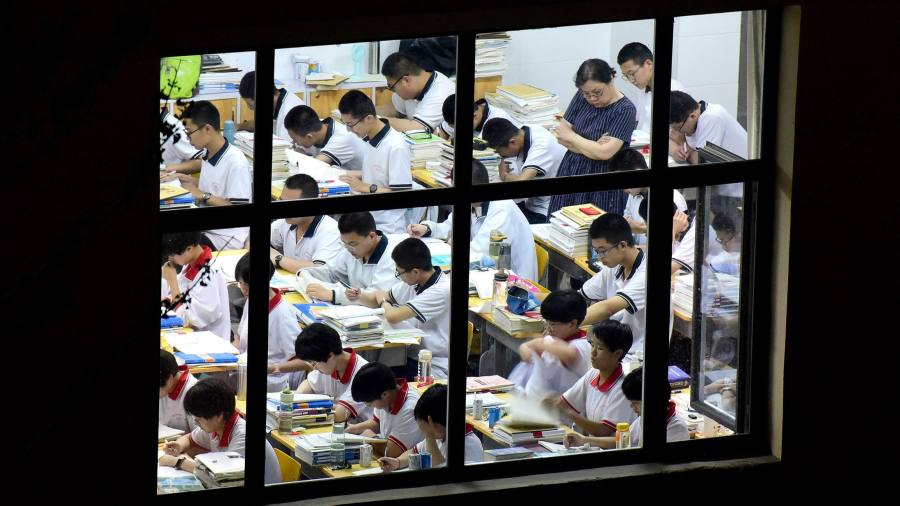Zhang, a student from China’s central Henan province, encountered a cryptic essay prompt while taking his university entrance exam this month: “Blowing out other people’s lamps will not make you brighter.”
The Chinese language essay question in China’s notoriously gruelling gaokao, which lasts two days and determines students’ university placements — and often their careers — has become increasingly nationalist in recent years.
But this year, examiners turned directly to “Xi Jinping Thought”, as the collected sayings of China’s president are known, asking students to respond to texts with strongly implied anti-US themes.
It is difficult to avoid Xi, China’s most powerful leader since Mao Zedong, and his Marxist musings — the president’s official portrait and banners bearing his slogans plaster shop walls and roadside billboards, and voluminous collections of his essays stock bookstore shelves.
But the embedding of Xi Jinping Thought in China’s education system to indoctrinate potential Communist party members from an impressionable age reflects a leadership anxious about threats to its control and a young generation increasingly disconnected from politics, analysts said.
“We can see the party putting more pressure on society and youth,” said Jean-Pierre Cabestan, emeritus professor at Hong Kong Baptist University. Geopolitical and economic threats “have clearly convinced the party leadership that they need a stronger leader, they need a symbol to glue the society around”.
Another question asked students to consider Xi’s phrase, “A flower blooming alone is not spring, but a hundred flowers blooming together makes the garden full of spring.” The exam said the texts were taken “from the speeches of General Secretary Xi Jinping, which express common truths in vivid language”.
Not all of the roughly 13mn students who sat the gaokao this year faced questions that explicitly covered Xi Jinping Thought. But many of those who did were in outlying provinces. In the north-western region of Xinjiang — where authorities have faced accusations of crimes against humanity over the detention of more than 1mn Uyghur and other ethnic minority Muslims — many questions promoted the importance of social cohesion.
This year, as Xi kicks off an unprecedented third term in office, there are signs he is looking to extend this cult of personality. Most official speeches and documents tout his formal doctrine, Xi Jinping Thought on Socialism with Chinese Characteristics for a New Era, which has been enshrined in China’s constitution — a privilege only similarly accorded to Mao.
One of the core principles of Xi’s ideology is to achieve the “Chinese dream of the great rejuvenation of the Chinese nation”, which is understood by many analysts to include replacing US “hegemony” with a multipolar world order in which a more assertive China wields significant global influence.
But despite his strong grip on domestic politics, China’s nationalist leader faces deepening tensions with the US and a flagging economic recovery that is contributing to record levels of youth unemployment. A rare outburst of protests in November against Covid-19 controls drew disaffected young people to the streets of the country’s largest cities.
“The party’s position in society and the party’s position globally — they’re insecure,” said John P Burns, emeritus professor at the University of Hong Kong. “This is why they are tightening central control and trying to get people to think the same thoughts.”
Xi’s personality cult is nowhere near as extreme as that of Mao, who fomented the disastrous Cultural Revolution to purge perceived challenges to socialism within the party and his leadership, according to analysts.
But some observers in the mainland describe Xi’s growing public presence as “the North Koreanisation of China”, a reference to the overwhelming dominance of Kim Jong Un in China’s smaller neighbour.
“There’s a sense of insecurity among the Chinese leadership and even paranoia,” Cabestan said. “That’s why we are coming back to that cult of personality.”
That message was well received by Zhang, the student in Henan province, who offered a geopolitical interpretation on his exam that might have made Xi proud, expanding on how US “hegemonism is not conducive to world peace”.
Another student, also surnamed Zhang but of no relation, wrote about how young people should “build a community with a shared future for mankind” — echoing a Xi stock phrase that many analysts take to refer to the end of US pre-eminence.
However, some teachers said the connotations of the exam questions would be lost on many students, particularly outside the cities of Shanghai, Beijing and Guangzhou.
“I teach science students — they don’t study politics and don’t watch a lot of news. They probably will not know the political background,” said a teacher surnamed Li in Henan province who helped her class prepare for the gaokao.
Hong Kong university’s Burns said the exams raised questions about the priorities of China’s leadership to educate the next generation. “Are they looking for ideological conformity or are they looking for originality and thinking outside the box?” he said.
Read the full article here




